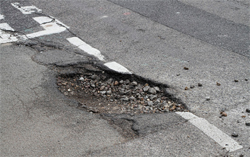
Truck drivers should brace themselves for miserable road conditions as a decade of reliance on cheap and brittle road repair materials finally takes its toll, warns Warranty Direct’s campaign website, Potholes.co.uk.
After the UK experienced more than a foot of rainfall in November and December and heavy snowfall in January and February, drivers will face increased journey times as councils and highways authorities close lanes for repairs, and average speeds drop as drivers slow to avoid pockmarked roads.
Potholes.co.uk said the relaying of cheap materials – brittle, porous Stone Mastic Asphalt as opposed to the more hard-wearing Hot Rolled Asphalt – to surface and fix roads over the last 10-15 years is now leaving Britain gridlocked.
Data taken from 10,000 pothole reports on Potholes.co.uk reveals that not only are the craters appearing on the UK’s crumbling network deeper than ever before, increasing in depth from 3 to 4 four inches on average in the last two years, but the problem is not limited to smaller rural roads.
Warranty Direct managing director, Duncan McClure Fisher, said: “The pothole epidemic is the direct result of years of underinvestment in our roads by the government. Temporary fixes have just escalated the problem over the years, and our highways have now got more holes than Swiss cheese.
“Unless more permanent repair materials and methods are adopted immediately, Britain may never again be able to get through a winter without having to contend with a Third World road network.”
Potholes are created when moisture seeps into cracks in the street surface and freezes, cracking open the road when it freezes and expands. Last year was the second-wettest since records began in 1910, with an average of 1330.7 mm falling on the UK. Combined with heavy snowfall and freezing temperatures, UK weather has created the ‘perfect pothole storm’, destined to tear apart the second-rate Stone Mastic Asphalt now used as standard for road repairs.






